#anthills of the savannah
Text
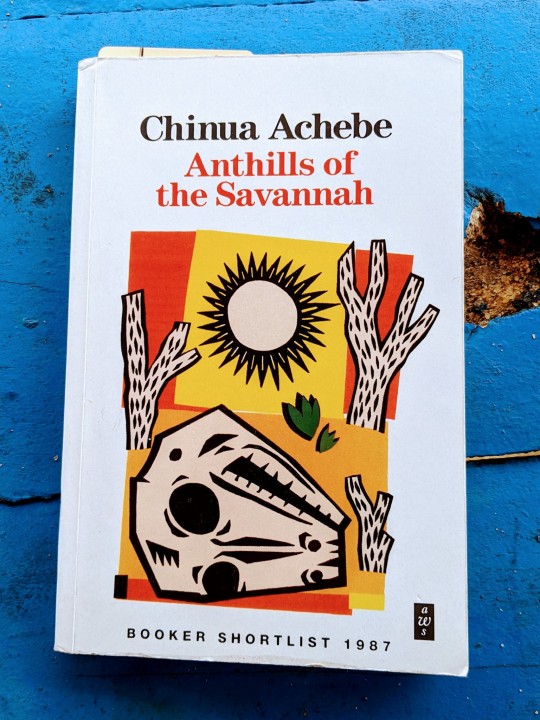
Anthills of the Savannah (1987) - Chinua Achebe
That we are surrounded by deep mysteries is known to all but the incurably ignorant.
#chinua achebe#anthills of the savannah#book#novel#african literature#nigerian literature#kangan#reading#cover art#read in Togo and Benin#read on January 2023#first book of the year#nobel laureate#quote
3 notes
·
View notes
Text
playing DA:O again had me thinking about ISO standard fantasy settings, and how they fail to consider basic questions like what the fuck do dwarves eat
they are never depicted as farming, except in maybe Dwarf Fortress; they certainly don’t have surface farms. even if you farm underground, 1) you are going to need a ton of space for farming, and 2) you need something in the food chain acting as a producer of nutrients. fungi are heterotrophs, like animals! they don’t fix carbon! where is energy entering the system??
this would be one thing if dwarves were depicted has having strongly non-humanoid physiology, but they’re literally just short little guys. short little guys, who are supposedly adapted to living primarily underground, who look exactly like their surface-dwelling savannah-adapted cousins. this is nonsense to me.
dwarves should be like cave olms. they should be detrivores and scavengers who are pale and blind. moreover, they’re not going to be excavating thousands of tons of rock to build their cities, for the simple reason all that rock has to go somewhere. and they can’t eat it; most rock isn’t going to be very chemically rich in energy, and then their tunnels are going to be filled with rubble/dwarf poop, because conservation of mass still applies.
dwarves that live near the surface might pile it up like an anthill; but if they live near the surface and build anthill-like structures, that suggests they’re also gathering resources from the surface. it would make sense if they even evolved to store nutrients in a honey-like form, or developed some degree of eusociality, though these near-surface varieties of dwarf could be nocturnal with big eyes if you wanted to keep the more underground-themed aesthetic. deep-downer dwarves would still be blind scavengers i think. the naked mole rat could also be a productive point of comparison here.
88 notes
·
View notes
Text

Chinua Achebe at his house in Enugu, Nigeria. 1959
He is one of Africa's most acclaimed authors and considered by some to be the father of modern African literature. His early novels, including the groundbreaking Things Fall Apart (1958) and No Longer at Ease (1960), describe poignantly the effects of Euröpean colonialism on Igbo society, Nigeria, and newly independent African nations.
He taught at the University of Nigeria, Nsukka (1976-81), and was founding editor (1971) of the influential journal Okike. Achebe returned to the novel form with Anthills of the Savannah (1987). He has also written numerous short stories, children's books, and a book of essays, Home and Exile (2000), reflecting on his and his nation's coming of age.
Guys let's get our YouTube channel (YT: Historical Africa) to 70k subscribers. Kindly click on the link to subscribe. 🙏 https://youtube.com/c/HistoricalAfrica
9 notes
·
View notes
Photo
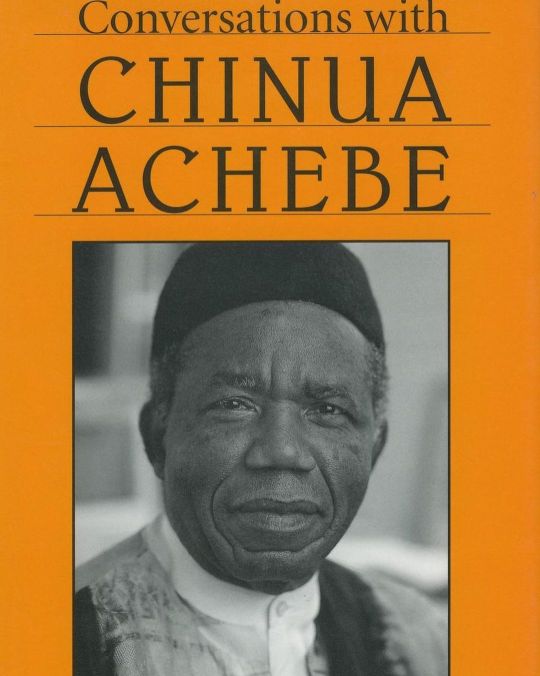
Chinua Achebe (born Albert Chinụalụmọgụ Achebe (November 16, 1930 – March 21, 2013) was a Nigerian novelist, poet, professor, and critic. His first novel Things Fall Apart, often considered his masterpiece, is the most widely-read book in modern African literature. He excelled at school and won a scholarship to study medicine, but changed his studies to English literature at University College. He became fascinated with world religions and traditional African cultures and began writing stories as a university student. After graduation, he worked for the Nigerian Broadcasting Service and soon moved to the metropolis of Lagos. He gained worldwide attention for his novel Things Fall Apart; his novels include No Longer at Ease, Arrow of God, A Man of the People, and Anthills of the Savannah. He wrote his novels in English and defended the use of English, a "language of colonizers", in African literature. His lecture "An Image of Africa: Racism in Conrad's Heart of Darkness" featured criticism of Joseph Conrad as "a thoroughgoing racist"; it was published in The Massachusetts Review amid some controversy. #africanhistory365 #africanexcellence https://www.instagram.com/p/ClBOuTmrFAq/?igshid=NGJjMDIxMWI=
2 notes
·
View notes
Note
howdy! i'm working on a mapping project right now and figured there's like, a 75% chance you named the rivers around pixandria at one point. if so, do you mind if i borrow them? linguistics is. not among my skillsets lmao
I actually didn't name the rivers, at least not in These Stones Remember, mostly because they didn't exist in the story! The desert around Paixandria was vast, and I didn't include any rivers.
That said, lemme have a think for you, since I do love coming up with names for places. Let's take a look at the S1 map:
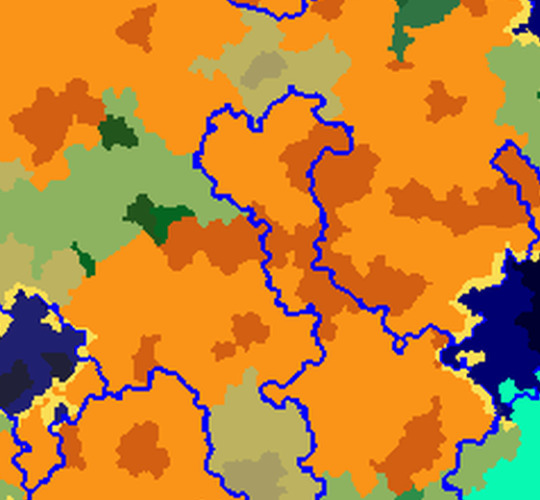
Pixandria nestles in the middle of that upward loop of river near the top of that image. The pale green above it is the savannah village that is partially encompassed by the Anthill, which is so huge that it actually covers part of the river (a river runs through it - literally).
So, using the technique I employed to come up with names for Paixandria, I would think that the people of the desert would have a name that meant something like "life-giver surrounding". Since I used Arabic as my base language for Paixandrian, I'll take the Google Translate words for those (they don't have to be 100% the correct words, if you're someone who speaks Arabic! I just use the words as a jump-off point for inspiration) and we have the following:
life = haya
giver = mueti
surrounding = almuhit
Picking little bits of each word and smooshing them together, I would say that the Paixandrian for that river is Aya'Muhet, meaning "life-giver surrounding".
If you like it, please feel free to use it :)
1 note
·
View note
Text
TOC: English Text Construction Vol. 16, No. 1 (2023)
ICYMI: 2023. iii, 108 pp.
Table of Contents
ARTICLES
“May the path never close”: A Deleuze-Guattarian reading of Chinua Achebe’s Anthills of the Savannah
Pyeaam Abbasi & Maryamossadat Mousavi
pp. 1–29
‘Narrative structure’, ‘rhetorical structure’, ‘text structure’: A conceptual complex meets text- and discourse‑world profiling shifts
Nelly Tincheva
pp. 30–58
Creating an information security policy in a bank: Linguistic aspects
Olivier Mozard T. Kamou
pp. 59–81
Dating “Sweet Desire”: C. S. Lewis’s http://dlvr.it/Sztb2q
0 notes
Text
AFRICA’S AUTHORITARIAN ‘BIG MEN’ DETERMINE THE LAW- Isaac Mwanza
AFRICA’S AUTHORITARIAN ‘BIG MEN’ DETERMINE THE LAW
By Isaac Mwanza
“Our present rulers in Africa are in every sense late-flowering medieval monarchs…”
~ Chinua Achebe, Nigerian author in Anthills of the Savannah
INTRODUCTION
This fourth and last in series of these articles is intended to show that legislation in Zambia, and indeed the rest of the African countries, continues to be dictated by…

View On WordPress
0 notes
Text
Chinua Achebe Prize for Literature 2022 shortlist announced.
Chinua Achebe Prize for Literature 2022 shortlist announced.
Michael Afenfia, Uwem Akpan, and Sylva Nze Ifedigbo are on the shortlist for the Chinua Achebe Prize for Literature 2022 announced on October 20, 2022.
Chinua Achebe was the author of Things Fall Apart (1958) the most well-read novel written by an African. His other novels were No Longer At Ease, Arrow of God, A Man of the People, and Anthills of the Savannah. He is also the author of many works…

View On WordPress
#Chinua Achebe Prize for Literature#Chinua Achebe Prize for Literature 2022#Michael Afenfia#Sylva Nze Ifedigbo#Uwem Akpan
0 notes
Text
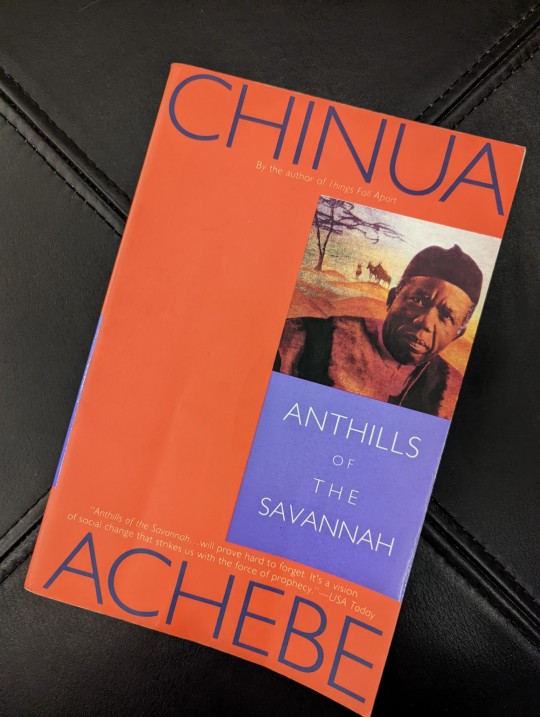
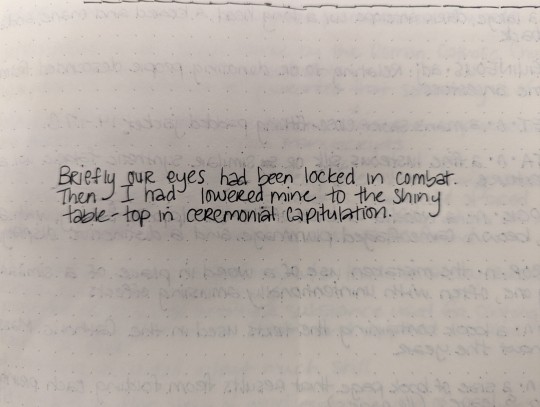
Briefly our eyes had been locked in combat. then I had lowered mine to the shiny table-top in ceremonial capitulation.
2 notes
·
View notes
Quote
And strange are the ways of deep emotion.
Chinua Achebe, from Anthills of the Savannah
#Anthills of the Savannah#emotion#Chinua Achebe#quote#quotes#lit#literature#bookofkhidr#book of khidr
228 notes
·
View notes
Photo

Chinua Achebe
Charity … is the opium of the privileged; from the good citizen who habitually drops ten kobo from his loose change and from a safe height above the bowl of the leper outside the supermarket; to the group of good citizens (like yourselfs) who donate water so that some Lazarus in the slums can have a syringe boiled clean as a whistle for his jab and his sores dressed more hygienically than the rest of him; to the Band Aid stars that lit up so dramatically the dark Christmas skies of Ethiopia. While we do our good works let us not forget that the real solution lies in a world in which charity will have become unnecessary.
48 notes
·
View notes
Quote
Storytellers are a threat. They threaten all champions of control, they frighten usurpers of the right-to-freedom of the human spirit — in state, in church or mosque, in party congress, in the university or wherever.
Chinua Achebe, Anthills of the Savannah
641 notes
·
View notes
Photo
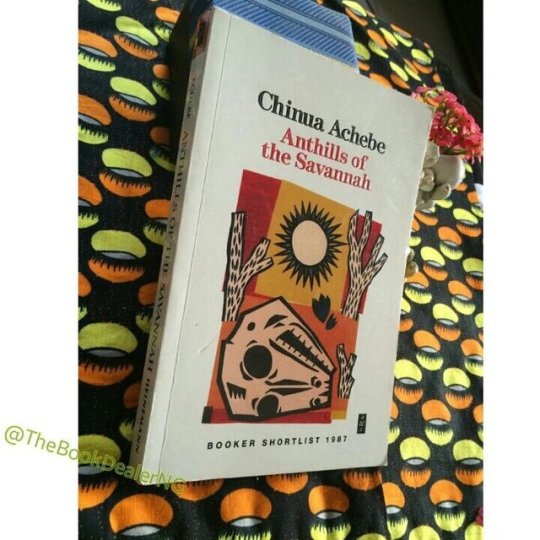
Currently Reading
Anthills of the Savannah
by Chinua Achebe
Chris, Ikem and Beatrice are like-minded friends working under the military regime of His Excellency, the Sandhurst-educated President of Kangan. In the pressurized atmosphere of oppression and intimidation they are simply trying to live and love - and remain friends. But in a world where each day brings a new betrayal, hope is hard to cling on to. Anthills of the Savannah (1987), Achebe's candid vision of contemporary African politics, is a powerful fusion of angry voices. It continues the journey that Achebe began with his earlier novels, tracing the history of modern Africa through colonialism and beyond, and is a work ultimately filled with hope.
#anthills of the savannah#chinua achebe#nigeria#africa#african#regime#politics#government#oppression#novel#fiction
2 notes
·
View notes
Photo

“If you don’t like someone’s story, write your own”- Chinua Achebe (Some of his well-known works include, Things fall apart; A Man of The People; ‘No Longer At Ease; and Arrow Of God. Chinua Achebe (/ˈtʃɪnwɑː əˈtʃɛbeɪ/; born Albert Chinụalụmọgụ Achebe, 16 November 1930 – 21 March 2013) was a Nigerian novelist, poet, and critic who is regarded as the most dominant figure in modern African literature. His first novel and magnum opus, Things Fall Apart (1958), occupies a pivotal place in African literature and remains the most widely studied, taught and read African novel. A titled Igbo chief himself, Achebe sought to escape the colonial perspective that predominated African literature, and drew from the traditions of the Igbo people, Christian influences, and the clash of Western and African values to create a uniquely African voice. His style relies heavily on the Igbo oral tradition, and combines straightforward narration with representations of folk stories, proverbs, and oratory. Along with Things Fall Apart, his No Longer at Ease (1960) and Arrow of God (1964) complete the so called "African Trilogy"; later novels include A Man of the People (1966) and Anthills of the Savannah (1987). In addition to his seminal novels, Achebe's oeuvre includes numerous short stories, poetry, essay collections and children's books. #listen to #Africa #now #everydayeverywhere on https://radiosubmarine.wixsite.com/radiosubmarine #linkinbio #Radio #broadcast #Radio_submarine #soundclould #African #music #africa #africanmusic #dance #podcast #afrobeats #follow #like #africaeveryday #playlist #afrococktail #afrodance #afropunk #afrobeat #photooftheday #photography #africaphotography #photoby Vivian Sassen https://www.instagram.com/p/CSHNoDTsADY/?utm_medium=tumblr
#listen#africa#now#everydayeverywhere#linkinbio#radio#broadcast#radio_submarine#soundclould#african#music#africanmusic#dance#podcast#afrobeats#follow#like#africaeveryday#playlist#afrococktail#afrodance#afropunk#afrobeat#photooftheday#photography#africaphotography#photoby
7 notes
·
View notes
Text
TOC: English Text Construction Vol. 16, No. 1 (2023)
2023. iii, 108 pp.
Table of Contents
ARTICLES
“May the path never close”: A Deleuze-Guattarian reading of Chinua Achebe’s Anthills of the Savannah
Pyeaam Abbasi & Maryamossadat Mousavi
pp. 1–29
‘Narrative structure’, ‘rhetorical structure’, ‘text structure’: A conceptual complex meets text- and discourse‑world profiling shifts
Nelly Tincheva
pp. 30–58
Creating an information security policy in a bank: Linguistic aspects
Olivier Mozard T. Kamou
pp. 59–81
Dating “Sweet Desire”: C. S. Lewis’s http://dlvr.it/Szr7MV
0 notes